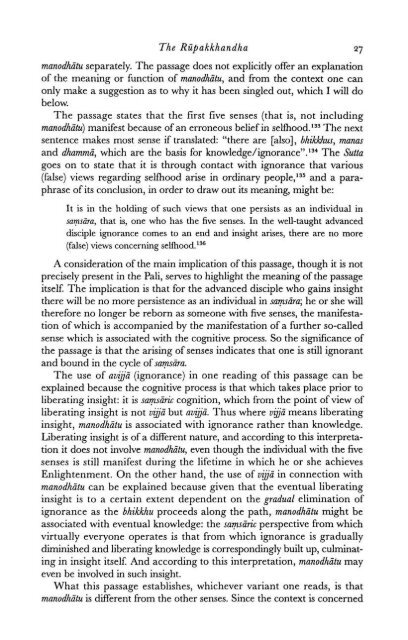Identity and Experience_Hamilton_1996
Identity and Experience_Hamilton_1996
Identity and Experience_Hamilton_1996
You also want an ePaper? Increase the reach of your titles
YUMPU automatically turns print PDFs into web optimized ePapers that Google loves.
The Rtipakkh<strong>and</strong>ha * 7<br />
manodhitu separately. The passage does not explicitly offer an explanation<br />
of the meaning or function of manodhiitu, <strong>and</strong> from the context one can<br />
only make a suggestion as to why it has been singled out, which I will do<br />
below.<br />
The passage states that the first five senses (that is, not including<br />
manodhitu) manifest because of an erroneous belief in ~e1fhood.l~~ The next<br />
sentence makes most sense if translated: "there are [also], bhikkhus, manas<br />
<strong>and</strong> dhammi, which are the basis for kno~ledge/ignorance".'~~ The Sutta<br />
goes on to state that it is through contact with ignorance that various<br />
(false) views regarding selfhood arise in ordinary people,13' <strong>and</strong> a paraphrase<br />
of its conclusion, in order to draw out its meaning, might be:<br />
It is in the holding of such views that one persists as an individual in<br />
samsara, that is, one who has the five senses. In the well-taught advanced<br />
disciple ignorance comes to an end <strong>and</strong> insight arises, there are no more<br />
(false) views concerning selfh00d.l~~<br />
A consideration of the main implication of this passage, though it is not<br />
precisely present in the Pali, serves to highlight the meaning of the passage<br />
itself. The implication is that for the advanced disciple who gains insight<br />
there will be no more persistence as an individual in samsiira; he or she will<br />
therefore no longer be reborn as someone with five senses, the manifestation<br />
of which is accompanied by the manifestation of a further so-called<br />
sense which is associated with the cognitive process. So the significance of<br />
the passage is that the arising of senses indicates that one is still ignorant<br />
<strong>and</strong> bound in the cycle of samsara.<br />
The use of aviji (ignorance) in one reading of this passage can be<br />
explained because the cognitive process is that which takes place prior to<br />
liberating insight: it is samsiric cognition, which from the point of view of<br />
liberating insight is not viji but au;jii. Thus where v;jii means liberating<br />
insight, manodhitu is associated with ignorance rather than knowledge.<br />
Liberating insight is of a different nature, <strong>and</strong> according to this interpretation<br />
it does not involve manodhitu, even though the individual with the five<br />
senses is still manifest during the lifetime in which he or she achieves<br />
Enlightenment. On the other h<strong>and</strong>, the use of viji in connection with<br />
manodhitu can be explained because given that the eventual liberating<br />
insight is to a certain extent dependent on the gradual elimination of<br />
ignorance as the bhikkhu proceeds along the path, manodhiitu might be<br />
associated with eventual knowledge: the samsiiric perspective from which<br />
virtually everyone operates is that from which ignorance is gradually<br />
diminished <strong>and</strong> liberating knowledge is correspondingly built up, culminating<br />
in insight itself. And according to this interpretation, manodhitu may<br />
even be involved in such insight.<br />
What this passage establishes, whichever variant one reads, is that<br />
manodhitu is different from the other senses. Since the context is concerned


